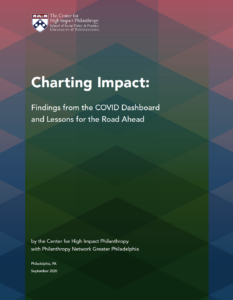The unprecedented and prolonged COVID-19 crisis led to the creation of more than a dozen shared philanthropic response funds in the Greater Philadelphia region, whose giving is measured by the new Regional COVID-19 Response Dashboard. Developed by the Center for High Impact Philanthropy (CHIP) at the University of Pennsylvania and Philanthropy Network Greater Philadelphia (Philanthropy Network) with support from William Penn and Lenfest Foundations, the dashboard is one of the first efforts to collect grants data from numerous pooled giving funds and share it publicly, mapped against demographic and economic data.
The regional dashboard was specifically designed for funders and nonprofits to answer questions about the flow of philanthropic support to address the effects of COVID-19 in Greater Philadelphia, including where grants were directed, who the funds were meant to help, what community needs were being addressed, which organizations received support and where there were gaps in funding.
Data provided by 13 COVID-19 philanthropic response funds in Southeastern Pennsylvania and Southern New Jersey revealed 4,892 grants totaling $40,133,289 across 10 counties in the region were awarded between March 18 and June 29, 2020. These funds represent the majority of the collective funding launched to provide relief from the initial effects caused by COVID-19.
“This dashboard was created to help understand how resources in the region were prioritized in response to the COVID-19 pandemic, as well as inform future grantmaking as it relates to the region’s recovery,” said Hilary Rhodes, Director of Evaluation and Learning at the William Penn Foundation. “With this new collective data, we have a clearer sense of how funds across the region were allocated and can hold ourselves accountable to ensure grantmaking is distributed equitably in the future.”
CHIP and Philanthropy Network released findings from the dashboard project on September 29 during a free webinar and in a companion report. One of the key lessons is that funders need better and more standardized demographic information in order to understand how well their grantmaking aligns with their social justice goals. Given the urgent community needs and time sensitivities associated with working in a crisis, speed and ease of application was prioritized, which limited the amount of demographic data collected.
Said Sidney Hargro, President of Philanthropy Network Greater Philadelphia, “Due to the urgent nature of crisis grantmaking, gaps in grantmaking processes are inevitable. COVID-19 has exposed the need to collect better data to ensure the equitable distribution of resources to address community needs.”
The report also contains lessons learned and recommendations for how funders can strengthen their ongoing response to the COVID-19 pandemic and preparedness for future disasters.
“The current version of the dashboard provides a data-informed view of our region’s initial philanthropic response to COVID-19,” said Kat Rosqueta, Founding Executive Director of CHIP. “By visualizing what’s been done, where need exists, and where gaps remain, the dashboard can also serve as a model for how funders might use data to inform decisions outside of COVID-19 response and recovery.”
The project was developed by CHIP at the School of Social Policy & Practice (SP2) at the University of Pennsylvania, with additional collaboration from the University of Pennsylvania: Actionable Intelligence for Social Policy at SP2 and Urban Spatial at the Weitzman School of Design.

